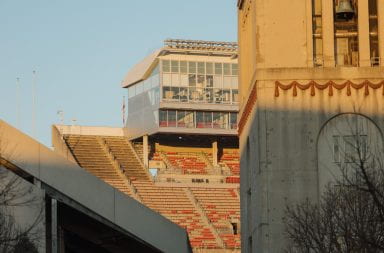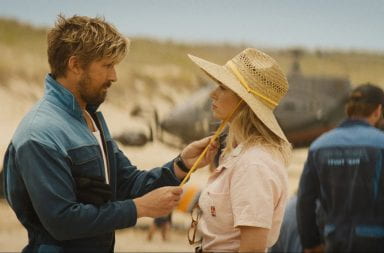
A gallery space is darkened, with black walls, wooden floor, and red light. White open captions are projected dimly onto the left wall. A wooden ramp curls up the back wall. Two people are mid-way up the ramp; the person on the right reclines vertically with arms behind their head, and the person on the right sits upright facing their friend. Two corridors flank the back wall. A soft red glow fills the space behind the back wall. Credit: Courtesy of Participant Inc
In the midst of unprecedented times, the Wexner Center for the Arts brings an exhibition that challenges its viewers to think about relevant social issues and ways in which individuals can make a change.
“Climate Changing: On Artists, Institutions, and the Social Environment” opens Saturday and will be on display until mid-May, though the end-date is subject to change based on the COVID-19 pandemic.
The exhibition was originally scheduled to be released May 2020, but due to the pandemic, it was delayed.
Regardless of the delay, exhibition curator Lucy Zimmerman said the exhibition is even more relevant now.
“This exhibition doesn’t really take on just one social issue. It’s a whole slew of themes and societal problems,” Zimmerman said. “I think that with COVID, the pandemic began to lay bare these issues of equity in terms of health care. Also, the systemic racism that’s really been laid bare.”
The exhibition features 16 artists, including Constantina Zavitsanos, whose piece “L&D Motel” tackles the issue of accessibility.
“It’s a ramp at a 5 percent grade for wheelchair accessibility with overlapping channels of audio, the sound of the artist speaking through those channels. But you can only experience that if you are actively using the ramp,” Melissa Starker, spokesperson for the Wexner Center, said.
Starker said this piece shows the viewer a different perspective and challenges their awareness.
“Someone who lives in a wheelchair — this is an inescapable part of their experience,” Starker said. “It’s something that people who do not require wheelchairs may use but not really think about. This is kind of a perfect example of taking something that’s around us, that’s being experienced by people, that not everyone is necessarily conscious of, and putting it in the forefront.”
Starker said the Wexner Center is furthering the ways in which they are committing to accessibility.
“Whether it’s an audio piece that also has a transcript for the hearing impaired or audio descriptions, these are things that we’re working on, so that as many people can engage with the center and its work as possible,” Starker said.
The Wexner Center is holding a free virtual writing workshop in connection with the exhibition Feb. 3 by Jibade-Khalil Huffman, creator of “We Don’t Need Another Mural,” which is featured in the exhibition.
The exhibition also includes an essay written by Zimmerman engaging in the meaning of themes explored in the exhibition. She said she used two books for inspiration: “The Question of Access: Disability, Space, Meaning” and “Queer Phenomenology: Objects, Orientations, Others.”
“Those books were super influential to me, and thinking about what is the space and what our bodies do in these spaces,” Zimmerman said. “I just began to unpack some of what they are, what they’re doing and why it was important to me.”
Although the exhibition’s original release was affected by the pandemic, Starker said the exhibition is coming at a pivotal time and can inspire patrons to create change.
“I think that everyone is looking at now as a time of reflection, potential healing and change. I think that the artists of ‘Climate Changing’ and the work that they’re presenting offer avenues and viewpoints that can propel that change or can help propel it,” Starker said.
Tickets are available on the Wexner Center’s website and at their Patron Services Desk. Admission is free for members, college students, visitors under the age of 18, active military and veterans, $7 for senior citizens, Ohio State faculty and staff with a BuckID and $9 for the general public.


